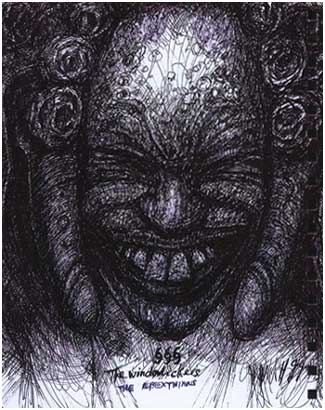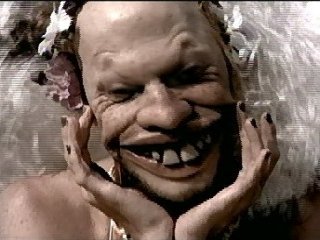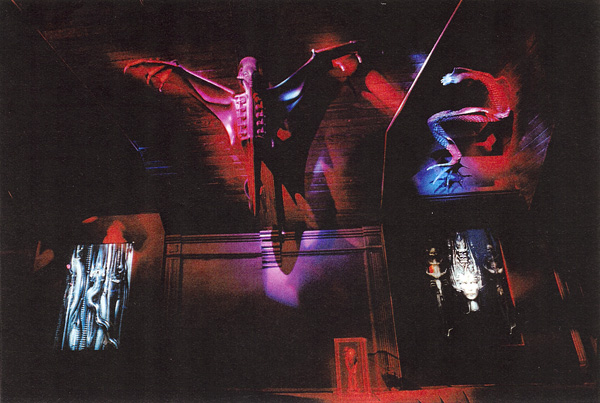The firearm has replaced the remote control as the choice extension of the central nervous system. The automotive/motor vehicle nervous system detailed by McLuhan has become inverted, a womb instead of a tomb, though no less unsafe at any speed than in its Naderian days. Patriarchs must seek the death drive elsewhere, since mortality in an automobile is now sudden (mid-text, between latte sips, in the midst of absolute comfort). The ego has not yet accepted its satiation, its ability to replicate the fertile cradle of the womb without the attendant mother, the mobile sanctuary module complete with Big Gulp/D-sized cup holders for Jumbo Cocoa Colostrum.
The remote control nervous system that followed the dominance of the automotive nervous system is essentially fossilized too, having been absorbed into the abstraction of the web’s singular consciousness, networked socially into the direct corporate transference of RSS feeding tubes. Whereas once it was a substitute for control, now the remote control, replaced almost entirely by the smart phone, is a habit-forming entity, a control in and of itself, a nerve network not by extension of the corporeal but as life support system for the body.
Now, the family unit, spoken for by proxy via the American male patriarch (feeling reduced to a mere shell casing by the existence of other voices at the collective dinner table), bows to the phallic luster of the gun. The cross was once wielded as a sidearm. Its symbolic efficacy was in the substitution of the Christ figure for the method of his destruction, but arched sideways the cross becomes a projectile weapon capable of expunging the lord’s holy vengeance silently through implied violence (more on the “implied” in just a minute). The gun is a monolith, an amulet of the absolutism of mortality. And in a culture that celebrates death and branding, the gun is God.
For the follower and the missionary of the church of holy death, the goal when holding one’s piece is to cock the hammer and ejaculate vengeance to assert power. If the spray of bullets seems sexual, this is no accident. The phallus has been weaponized against mates since the time of pri-mates and now its artificial parallax is being used, with no small degree sociopathic intent (and occasionally homoerotic desire), to hold other marginalized populations in submission.
The gun spray cumshots are secretly normalized. They are the common denouement of every porno and action film alike. They are frowned upon “IRL”, but normative in the consensuality that allows them to become accepted and unspectacular when happening to marginalized targets, (life in the “ghetto”, “crimes of passion”). As long as the deviance (bursts of bullet jizz) is sporadic and decentralized (“apolitical”), they can go on unabated. To even address them in polite company would be a greater sin than the myriad oozing bodies dripping below the patriarch/phallic-cult devotee’s cold, brute determinism (final judgment outsourced to the crucifix end-user).
Men have come to prefer the cumshot in porn because its extrinsic nature allows no possibility of childbirth. Just as well, cumshots feed into the survivalist cultural nostalgia for the hunter-gatherer society as well as the Greco-Roman warrior victory rapes by allowing sex without procreation or sex without fatherhood to persist. Just as well, it provides relief for men who must endure a burdensome dependence upon women for the perpetuation of the species. Without people or animals to kill constantly, men are left without meaning, hanging with their third arm/firearm in the wind. When survival is easy for an unnecessary species, one must create threats to justify one’s place at the top of the food chain, proffering legitimacy by inventing bold conspiracy theories. Or play zero sum games that attempt to mollify/disarm purpose from either A) those (mothers) whose biological destiny is rich with meaning or B) those (oppressed groups) whose struggle frames them as the recipients of history.
But the sacral significance of childbirth is not lost on the desubjectivized Y chromosome subject. Perhaps due to the distantiation of the post-hunter/gatherer male from motherhood and the eternal separation of the anus from childbirth, Phallus Dei must hold youth in high regard. Indeed it will be youth who will need to survive when the Bush Doctrine of tactile preemptive assault is applied to the ensuant zombie apocalypse and we slay the undead before they’re undead with the help of our exterminating halo-tipped angels. (The fad for zombie-kill porn is the outsourced final judgment, which quenches the patriarch’s bloodlust in the form of general misanthropy. In Zombie fiction, the enemy is everyone and everyone must be bludgeoned or shot in properly ejaculatory fashion. Catharsis for those too polite to partake in mass shootings).
With the sacralization of youth at the expense of motherhood then, men of the gun-worship illuminati cult thus recognize Adam Lanza’s sin was in his target, in producing child porn, spraying the wrong targets and appealing to the wrong demographic, precipitating an event that mocked God’s free-market rationalism ( that event being the Situationist/Industrial music credo that absolute freedom was best exemplified in the Moor Murders/the surrealists saying the most surreal act is running down a street firing a gun at random/Ayn Rand with the blinders on going on about the versatility of heroic myth while belittling the poor as parasites and ushering in their destruction via the pesticide infinity of accumulative ritual power/Hannah Arendt admonishing proto-neocon Leo Strauss as being no better than the German fascists he fled/anarchism as libertarianism with arbitrary pipe bombs instead of self-sustaining militias/fundamentalism whose ends justify so many means that it teeters on nihilism).
We need to protect guns from the people who would do them harm, hurting a gun being the equivalent of openly ripping the bible in the town square (It would never hurt a fly; it’d kill it dead). We’re half-afraid guns will punish us if we abandon them, like a lovelorn mate trapped in an abusive relationship (cue gender role reversal #1). We feel emotionally attached to the gun as provider, the life-taker that allows us to invert the intrinsic power dynamic of childbirth and send the (18 and above, please) products of the childbirth back into the womb of the earth’s tomb. If they take our guns, the only option is massive upheaval, a temper tantrum at the mom/nanny/bitch who took our toys. Bukkake the heretics into mass graves. These are the terrorists who would crucify Koresh, surrender Alex Jones to the fate of Milton William Cooper, leave poor Bernie Goetz to his white supremacist fanfic, and delibidinize Nichols and McVeigh (the American soldier must remain posed in rescue-ready portraiture, not rendered in an amputated, impotent hospital setting. More on him in a bit).
Our martyrs are self-inflected wounds, bad guys we invent to justify murdering them publicly. James Holmes and his head on the spike will welcome entrance in the suffering city, a place where everlasting pain is bred by the eternal endurance of gravity’s transience, the forever passing notion of inevitability rather than prevention (“there is no alternative”). What happens is soon forgotten, 140 characters like Holmes gone in a flicker like discarded matchbooks pressed sporadically against the ground to keep the world aflame. It’s all disease and no cure. Mass shootings become simulacrums, interminable war refracted through the capitalist green zones. Like collateral damage, all the dead kids must be scrubbed for the grand religious narrative, the forcefeel of emotional security. We are safe because the guns that are in the wrong hands are in the right hands are in the left hands are in God’s holy temple.
Our weapons, though expulsive, remain composed in the absence of the end-user/consumer/missionary subject. Lying flat on a table, a gun is at perfect harmony with the world it creates. In their anthropomorphic inertia, guns exercise perfect restraint in all the ways that men cannot and are therefore the conservative platonic ideal; power as (literal) pillar, power as pure concentrated energy, a negation of Focault’s idea of power as a process. The substitute father/god figure of the gun is a paradigm of stoic virtue, the absence of feminine emotionalism and irrationality. Crimes of passion are the vice of men. Guns are pure of intent. And it’s intent that men value, specifically how well intent correlates to popular subjectivity. Shooting a gun with noble intent is an act of heroism. Shooting it with ill intent is something else entirely.
The gun assumes a gaze of authoritative respect; its very presence in a dimmed room demands submission to its fascistic whims. Its essentialist nature as a power object (decontextualized of the means of production) contravenes the existential rights of liberty. The gun repurposes freedom as bondage to the gunowner. Thus, worship of the gun is a master-slave relationship, a Stockholm Syndrome where the victim kidnaps himself. Guns are almighty because they take life, they dominate us. But as mere functional utilities, they do not do so on their own, they transfer their godlike powers unto us. They are beholden to our will. People kill people. Guns merely confirm that men are killers.
To present a gun in a room is to violate a human being who thought they were free. Guns perform the rape of consciousness even if rape by will is not enacted by its user. To not own a gun is surrender, which is perhaps why several U.S. district counties have toyed with the idea of making their purchase mandatory (and coverage from getting shot by them is not compulsory, let the chips fall where they may: maternal value collapsed under the money shot of free enterprise). Thus, the two roles left for women in the phallic utopia, victims and vigilantes, have been mischaracterized because they assume the freedom to choose even these limited roles. A room with a gun in it is a room frozen in space-time, suspended from motion until the gun and its user define the terms of continuity.
What guns don’t do is pertinent, as psychic violence is perhaps its most common crime, but this is largely unprosecutable. With a gun in the room, the violation need not be measured in physical holes. Its first victim is speech. A gun is in charge of the conversation and he who writes the scripts determines where the narrative goes.
If the gun is god, it is also father, as well as big other. The very thing preventing a lasting peace (a world without guns) is the presence of the gun. If this mystic power did not exist, we would not need to use it to kill the men who yield it. But as a phallic weapon that protects male extinction in the age of artificial reproduction, the gun forms a lasting barrier to keep women contained (“safe”) and constantly refreshes the collective unconscious horrors that plague them (the hero creates a situation that puts the damsel in peril/”distress”, but is vindicated as he rescues her. The heroism is rewarded and the peril is forgotten).
A gun’s strange black magick makes invisible its ambient terror, as well as its rape of consciousness, and simulcasts an inversion of itself as the preventer of terror and rape. As a tactile piece of metallurgy, the firearm’s structure suggests that it is a cause-and-effect apparatus. Like shopping, part of the gun’s sense of security that is provided to the impotent male is the production of immediate results. There is no red tape. There are not multiple steps and layers of due process to navigate. You go to the store, you buy the item and leave. You go to the bad guy, you fire the gun and leave. Free market magick with no externalities. And so many varieties with which to accessorize (the housewife gender role reversal #2)!
Hence, with guns, there are only cumshots and no comas, only bodies and no victim’s family. The only residue is the cumshot/blood leak/ crime scene itself, with a quick fade on to the next scene. No interiority from the body bathed in sticky blood. No lingering sense of anything lost or the humility of the victim. Thus, the byline reads that a gun’s purpose in society is to outsource crime prevention, not to hasten crime creation. A clever editing scheme.
The narrative has correlatives in popular media; the retreat into video games wherein the only consciousness is that of the gun. In many games and in particular first-person shooters, the user plays as the gun. It is a tale from the gun’s perspective. All enemies are obstacles, impediments, and roadblocks. The only agency is that of the phallic monolith. This is part of why gamers make the best misogynists and have been known recently to launch online lynchings in which they send pictures of themselves raping feminists who critique their favorite parlor/video games (time-honored favorites include the sport of broadcasting privilege, confident that the gun below their belt is job security). The video game controller appears as if a vestigial remnant of the remote control nervous system, and syndromic of the wired-in network consciousness of the web’s shared nervous system, but it’s actually an extension of the monolith gun, particularly when playing the aforementioned shooting games.
Some of the most popular video games are games of war and it’s no secret that culture tries to reproduce the thrills of war in various contexts in order to assure the ascendancy of the gun-throne in the popular imagination. Films that do not contain the threat of a loaded weapon (or a phallic substitute like a sword) fare poorly unless loaded with masked cumshots (grossout comedies), defamation of the childbearers (predatory or adulterous women), or the heterosexual romantic narrative which must conclude with the successful acquisition of a well-balanced man (in this fantasy, some character flaw is able to be corrected by the woman as long as there is no threat to his phallic authority). However, films of war (whether global conflict, personal revenge stories, or tales that brand phallic pathos as superego/superheroics) remain the heart of spectacle. War is the dominant force of meaning and its nucleus is the gun. Guns make war both necessary and possible.
At the center of the war is the soldier/martyr, the gun’s main frontline missionary. He is the killer walking among us, trained by ranks to internalize the thing he has done upon his return home. As he walks about in a culture pretending that the war outside does not exist, he is the hidden proof, the redaction allowed to roam free in white space. With gun in tow, the soldier protects the homeland, and consequently assumes the role of father figure for the whole nation. Ironically, the soldier must often exit his own fatherly duties to become father/protector for the nation, making him both absentee father and substitute father, deadbeat dad and figure of valor. This act of sacrifice, trading one’s own family for the collective family, on the face of it seems noble, but its main consequence is further alienation from motherhood, abandoning the birth-givers to lay praise to the life-taker in the gun, anti-survivalism plunged ever deeper into void. The cause is secondary, a homeland security blanket to throw over the desire to kill.
In the leisure society, the remote was God. God was happening to us, and we were standing in the shadow of His voice. We existed because God allowed us to. Now, the gun affirms our right to nonexistence. For the disenfranchised, the gun is the equalizer. It is post-religion, post-passivity. It’s no mistake that many of the most zealous phallic-cult devotees do not believe in evolution. Animals can’t evolve if they annihilate their own species or destroy their own ecosystem. The gun is an economy of chaos, tired of the narrative of perpetual progress. It’s looking for punctuation, the end of history.
The gun works especially well in societies where individualism is prioritized since the gun inherently puts a distance between its user/missionary and its object. With the gun in hand, one never has to die alone, because one can always feel secure that he can take someone else down with him. With a gun, one can make sure that their sadness won’t fail to strike a lonely chord, that it won’t reverberate or not make a sound in the forest. The gunshot is the sound of the tree falling. The endless cumshots are the sound of the empire crumbling.
The gun is the amplifier and the
silencer, but nothing else. It is
Manichean and defining. The gun shows us
a picture of the world as we believe it to be, not an experience of the world as
we want it to be. Thereby, it is an
instrument of faith. Guns continue to
kill because our rash attempts to make the air unbreathable, the food inedible,
the streets unwalkable, the climate untenable, and the culture impersonable and
unapproachable are not happening fast enough.
Indeed, it is only a matter of time before we turn the gun on ourselves
and end our practice of creating life to focus on ending it. Then, we will become one with the monolith,
the ultimate phallic god, the stiff corpse, at perfect peace with its
surroundings. At that moment, we will
find peace in each other’s arms. Our story can then be told because it will
have punctuation and we will have become death, creator of worlds.




































